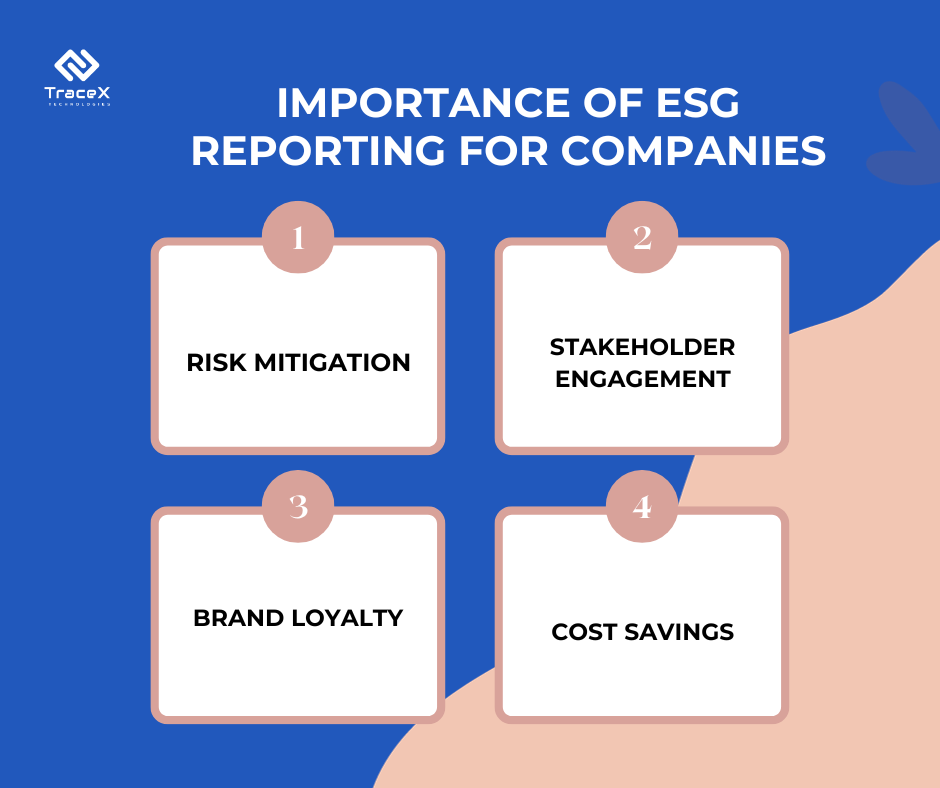Contact: +91 99725 24322 |
Menu
Menu
Quick summary: Explore how ESG principles are driving sustainability in the food industry, from farm-level practices to transparent supply chains. Learn about challenges, innovations, and the path forward to creating a sustainable food system.

From farm practices that degrade soil health to packaging that fills landfills, ESG in food industry highlight its massive environmental and social footprint. Consumers are demanding change, regulations are tightening, and businesses face mounting pressure to prove their commitment to ethical and sustainable practices. Sustainability is no longer a nice-to-have in the food industry; it’s a business imperative
A report by Trace Grains states that while 64% of food brands deem environmental, social, and governance (ESG) compliance crucial, a notable 41% acknowledge falling short of achieving full compliance.
How can food companies navigate these complex demands while maintaining profitability and growth? Enter ESG principles, which offer a roadmap for transforming the food supply chain sustainably, from farm to fork. Let’s explore how embracing ESG is revolutionizing the food industry.
Key Takeaways
ESG, which stands for Environmental, Social, and Governance, is becoming a key focus in the food industry. It’s about making sure that food businesses not only make profits but also care for the planet, treat people fairly, and operate ethically
The environmental aspect of ESG revolves around reducing the food industry’s impact on the planet. This means:
The social side of ESG is about how food companies treat people—both within their own organizations and across the communities they touch.
Governance focuses on how a business is run. Good governance means being ethical, transparent, and responsible in all operations.
By adopting ESG principles, food companies can create a more sustainable, fair, and transparent food system that benefits everyone—from farmers and employees to consumers and the planet.
The food industry is transforming, and ESG (Environmental, Social, and Governance) factors are at the heart of this change. But what’s really pushing companies to prioritize ESG?
Today’s consumers care deeply about where their food comes from and how it’s made. They want to know that the food they eat hasn’t harmed the planet or exploited people along the way. For example, many shoppers prefer products labeled as organic, fair trade, or sustainably sourced. This demand for transparency and ethical sourcing puts pressure on companies to trace their supply chains, eliminate harmful practices, and show their commitment to doing things the right way. Companies that can prove their products are ethically and sustainably made often gain loyal customers.
Governments worldwide are stepping up with stricter rules and regulations aimed at protecting the environment, ensuring ethical practices, and safeguarding public health. A good example is the EU Deforestation Regulation (EUDR), which requires businesses to prove that their products are not linked to deforestation. Companies that fail to comply may face hefty fines and barriers to market access. By adopting ESG practices, businesses can stay ahead of regulations, minimize risks, and ensure smooth operations across borders.
In a crowded market, standing out is tough. Embracing ESG can give food businesses a competitive edge. By prioritizing sustainability, ethical sourcing, and transparency, companies can appeal to socially conscious consumers and gain recognition as leaders in responsible business practices. This market differentiation can lead to increased sales, partnerships, and even better relationships with investors who are keen on supporting sustainable and ethical ventures.
More and more, businesses are realizing that they have a responsibility to contribute positively to society and the environment. This goes beyond just making profits; it’s about building a brand that people trust and respect. Companies with strong ESG commitments are often seen as more credible and reliable. On the flip side, any hint of unethical practices—like using child labor or causing environmental harm—can lead to public backlash and long-term damage to a brand’s reputation. Adopting ESG measures shows that a company takes its impact seriously, enhancing its image and building stronger connections with customers, employees, and communities.

The food supply chain is complex, and every step—from growing crops to putting food on shelves—carries an environmental and social impact. ESG (Environmental, Social, and Governance) principles offer a framework to tackle these challenges head-on.
A big part of sustainability starts right on the farm. Climate-smart agriculture involves using techniques that reduce greenhouse gas emissions, protect soil health, and adapt to changing weather conditions. For example, practices like crop rotation, reduced tillage, and planting cover crops help maintain healthy soil, prevent erosion, and store more carbon in the ground. Additionally, companies are taking steps to reduce deforestation, ensuring that forests aren’t cut down to make way for farming. By promoting such sustainable practices, businesses can help farmers produce food while preserving the planet’s natural resources.
A leading spice processor from Karnataka, India, with global operations in Vietnam and Turkey, utilized the TraceX Sustainability Platform to ensure their products’ authenticity and safety. By adopting TraceX’s blockchain-powered traceability solutions, the company enhanced supply chain transparency, verified product origins, and strengthened quality control processes. This commitment to sustainability and quality not only built trust with consumers but also demonstrated their dedication to ethical sourcing and food safety.
Ethical sourcing is about making sure that people in the supply chain—like farmers and factory workers—are treated fairly. This means ensuring safe working conditions, fair wages, and zero tolerance for child or forced labor. Many companies now embrace fair trade practices, which guarantee that farmers and workers receive a fair share of the profits and are empowered to invest in their communities. Ethical sourcing is good for the people who produce our food and strengthens trust with consumers who want to buy products they know are made responsibly.
Food waste is a massive issue. Tons of food get lost or thrown away every day, even as millions go hungry. ESG principles push for better logistics and consumer awareness to reduce waste. This means improving storage, transport, and packaging to ensure food stays fresh and reaches markets efficiently. Companies also work with retailers and consumers to find creative ways to reduce food waste, like donating excess food or using “imperfect” produce that would otherwise be discarded.
Single-use plastic and non-recyclable packaging contribute to pollution and harm the environment. To address this, many food companies are investing in sustainable packaging solutions. These innovations include using biodegradable materials, developing packaging that can be easily recycled, and reducing the overall amount of packaging used. The goal is to minimize waste while still protecting food quality.
The food supply chain can generate significant greenhouse gas emissions, from farm machinery to transport and processing. Carbon management initiatives aim to cut down on these emissions at every stage. Companies may adopt more efficient production methods, switch to renewable energy sources, or partner with farmers to capture carbon through sustainable land management practices. By reducing emissions, the industry contributes to global climate goals and makes the food system more resilient to climate change.
Food companies encounter several challenges as they strive to adhere to Environmental, Social, and Governance (ESG) compliance. These challenges reflect the complex nature of the food industry and the multifaceted expectations placed upon companies to operate sustainably and responsibly.
Technology solutions play a crucial role in helping companies adhere to Environmental, Social, and Governance (ESG) compliance by providing tools and platforms that facilitate data management, analysis, and reporting.
Technology solutions enable companies to collect, aggregate, and manage vast amounts of data related to their environmental, social, and governance performance. Automated systems can streamline data collection processes, ensuring accuracy and reliability.
Advanced reporting platforms and dashboards allow companies to present their ESG performance transparently. Automated reporting systems help generate comprehensive reports aligned with various ESG frameworks and standards such as GRI (Global Reporting Initiative) or SASB (Sustainability Accounting Standards Board).
Technology solutions, including blockchain and supply chain management systems, enhance visibility into complex supply chains. This visibility is crucial for tracking and verifying sustainability practices across suppliers, ensuring compliance throughout the entire value chain.
Environmental performance is a key component of ESG compliance. Technology solutions, such as carbon accounting software and IoT (Internet of Things) devices, enable companies to accurately measure and track their carbon emissions, helping them meet reduction targets.
Technology can be employed to monitor and ensure ethical labor practices across the supply chain. This includes tools for auditing, tracking working conditions, and addressing potential human rights violations.
Technology solutions automate the monitoring of evolving ESG regulations and standards. Companies can stay informed about changes in compliance requirements and adjust their strategies accordingly to meet new obligations.
The TraceX platform offers a comprehensive solution to address ESG (Environmental, Social, and Governance) challenges faced by the food industry.
TraceX leverages blockchain technology to provide end-to-end traceability across the entire food supply chain. By ensuring transparency and immutability of data, it enables companies to track every step of their product journey, from farm to fork. This helps companies meet stringent regulatory and compliance requirements, as well as address consumer demand for ethical sourcing and transparency.
Explore our Food Traceability Platform
TraceX’s platform ensures that products are sourced ethically by tracking and verifying the origin of raw materials, compliance with fair labor practices, and adherence to environmental standards. This helps businesses meet their social and environmental commitments by identifying and eliminating unethical practices, such as child or forced labor, and ensuring compliance with fair trade principles.
Explore our Sustainability Platform
By digitizing and automating data capture across all stages of the food supply chain, TraceX facilitates real-time data analysis, helping companies monitor key ESG metrics such as carbon emissions, resource usage, and waste reduction efforts. This data-driven approach allows companies to set measurable goals, track their ESG performance, and continuously improve their practices to achieve sustainability targets.
TraceX supports engaging and collaborating with suppliers, farmers, and other stakeholders. It provides tools for data sharing, training, and incentivizing sustainable practices, ensuring that all participants in the supply chain align with the company’s ESG goals. This collaborative approach helps bridge gaps in ESG compliance across multiple tiers of the supply chain.
Explore our Farm Management Platform
The platform makes it easier to ensure compliance with global and regional ESG regulations, such as the EU Deforestation Regulation and food safety standards. By offering detailed and immutable records, TraceX helps companies mitigate risks, demonstrate due diligence, and build consumer trust through transparent and responsible business practices.
Explore our EUDR Platform
TraceX’s capabilities extend to tracking carbon emissions and waste reduction initiatives, enabling food companies to measure and reduce their environmental footprint. The platform supports climate-smart practices at the farm level, as well as sustainable packaging and waste reduction efforts across the supply chain.
Explore our DMRV Platform
The journey toward integrating ESG principles in the food industry is complex, but it’s vital for a sustainable future. By focusing on environmental responsibility, social fairness, and transparent governance, companies can transform the entire supply chain—from farm to fork. This approach not only minimizes negative impacts on the planet but also builds consumer trust and strengthens brand resilience. While challenges like cost and supply chain complexity persist, the path forward is about collaboration, innovation, and unwavering commitment. By taking these steps, the food industry can truly lead the charge toward a more sustainable world.
ESG stands for Environmental, Social, and Governance principles. In the food industry, these principles are crucial for reducing environmental impact, ensuring fair labor practices, and maintaining transparent business operations, ultimately leading to sustainable and ethical practices across the supply chain.
Food companies can adopt practices such as climate-smart agriculture, efficient logistics to minimize food waste, sustainable packaging solutions, and carbon management initiatives, all of which reduce greenhouse gas emissions and improve sustainability.
Some key challenges include high costs of transitioning to sustainable practices, complex supply chain traceability, balancing profit margins with sustainability goals, and engaging suppliers to ensure compliance with ESG standards across multiple tiers of the supply chain.
